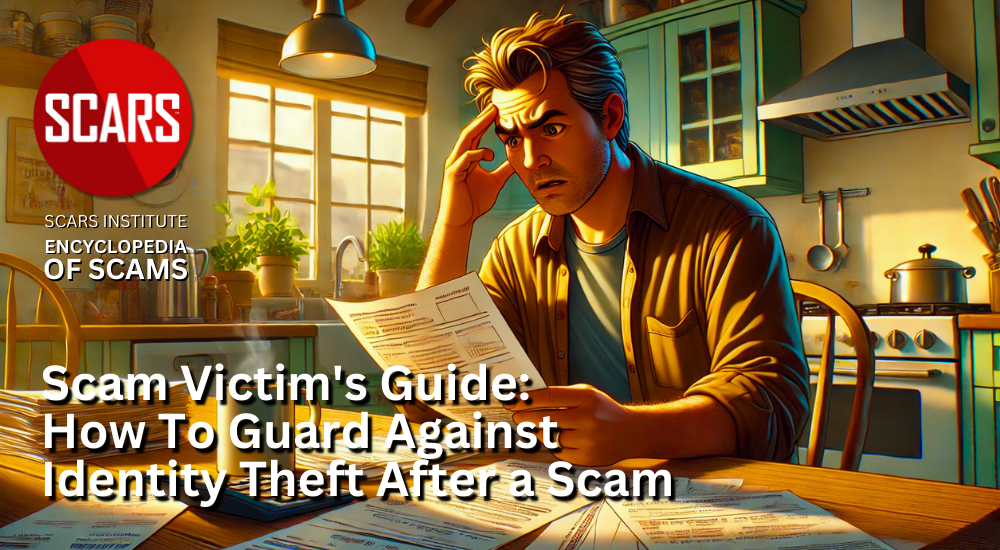
SCARS Institute’s Encyclopedia of Scams™ Published Continuously for 25 Years

Avoid Christmas Holiday Scams
Typical Christmas Holiday Scams: What to Watch Out For and Avoid – Don’t Become a Scam Victim This Year
Catalog of Scams – A SCARS Institute Insight
Author:
• SCARS Institute Encyclopedia of Scams Editorial Team – Society of Citizens Against Relationship Scams Inc.
Article Abstract
During the Christmas holiday scams season, scammers exploit the festive spirit and increased online activity to target unsuspecting individuals through various schemes.
Common holiday scams include fake online shops offering unrealistic discounts, phishing emails impersonating trusted retailers or courier services, and charity fraud designed to take advantage of seasonal generosity.
Social media scams, gift card tampering, romance scams, and travel fraud further highlight the range of deceptive tactics employed during this time. Delivery scams involving fake tracking links are also prevalent as people eagerly await packages.
To stay protected, individuals should verify websites, avoid suspicious links, research charities, and remain cautious with unsolicited offers or requests. By staying informed and vigilant, people can safeguard their finances and personal information while fully enjoying the holiday season.

Typical Christmas Holiday Scams: What to Watch Out For and Avoid – Don’t Become a Scam Victim This Year
The holiday season is a time of joy, generosity, and shopping. Unfortunately, it is also a prime opportunity for scammers to exploit people’s goodwill, urgency, and excitement. From fraudulent websites to fake charities, understanding these scams can help you protect yourself and your loved ones during this festive period. Below are eight common Christmas holiday scams and tips on how to avoid them.
1. Fake Online Shops
Scammers create fake e-commerce websites offering unbelievably good deals on popular gifts to steal money or personal information. These sites are designed to look legitimate, featuring enticing prices to lure shoppers into making quick purchases. Once payment details are entered, the scammers either disappear with your money or use your credit card information for further fraudulent activities.
Tip: Always shop from trusted, well-known retailers. Verify the legitimacy of a website by checking reviews, payment security features, and contact information.
2. Delivery Scams
During the holiday season, people are eagerly awaiting package deliveries, making delivery scams particularly effective. Fraudsters send fake texts or emails pretending to be from courier services, claiming packages require additional fees or personal details to complete delivery. Clicking on these links can lead to phishing sites or malware downloads.
Tip: Avoid clicking on unexpected delivery-related links. Instead, verify delivery updates directly on the courier’s official website using tracking numbers.
3. Gift Card Scams
Criminals manipulate gift cards sold in stores or request payments via pre-paid gift cards for online purchases. In some cases, scammers tamper with gift cards before sale, stealing the funds once the cards are activated. Online scams often insist on gift card payments, as these are difficult to trace and recover.
Tip: Only purchase gift cards from reputable sources. Never pay for goods or services using gift cards when requested online.
4. Charity Fraud
The season of giving makes people more inclined to donate to charities, which scammers exploit by creating fake charitable organizations. Fraudulent websites and phone calls request donations, tugging at heartstrings with fabricated stories.
Tip: Verify the legitimacy of a charity through its official website or platforms like Charity Navigator. Be wary of unsolicited donation requests, especially if payment must be made urgently.
5. Social Media Scams
Fraudsters leverage social media platforms to post fake competitions, giveaways, and extreme discounts. These posts often encourage users to click on links, share personal information, or send small payments to claim their “prizes.” In reality, the scammers steal personal details or money.
Tip: Avoid clicking on links or participating in competitions shared through unfamiliar accounts. Verify the authenticity of promotions through the company’s official page or website.
6. Phishing Emails
Cybercriminals disguise emails as messages from trusted retailers, banks, or service providers. These emails often include urgent calls to action, such as confirming account details, recovering lost orders, or clicking links for exclusive deals. Once clicked, they steal sensitive information like passwords or banking details.
Tip: Be cautious with unsolicited emails. Verify the sender’s email address and avoid clicking on suspicious links. Contact the organization directly if in doubt.
7. Romance Scams
Fraudsters exploit individuals looking for companionship during the holiday season by building trust and emotional connections online. They eventually fabricate emergencies requiring financial assistance, manipulating victims into sending money under false pretenses.
Tip: Be wary of online relationships that progress too quickly or involve requests for financial help. Never send money to someone you have not met in person.
8. Travel Scams
The holidays often involve travel, which scammers take advantage of by offering fake travel deals and vacation packages. These offers may involve low prices for flights, hotels, or tours that seem too good to be true. Once payment is made, victims realize the services do not exist.
Tip: Book travel through trusted platforms or directly with airlines and hotels. Be skeptical of unsolicited offers and deals requiring immediate payment.
How to Avoid Holiday Scams
- Verify Websites: Only shop on trusted, official websites. Avoid deals that seem too good to be true.
- Double-Check Delivery Messages: Never click on unexpected links in delivery-related emails or texts.
- Be Cautious with Gift Cards: Buy gift cards from reputable retailers and avoid paying for online purchases with them.
- Research Charities: Confirm a charity’s legitimacy through its website or official databases.
- Think Before You Click: Ignore suspicious emails, e-cards, and social media offers for giveaways or extreme discounts.
Conclusion
The holiday season, while joyous, creates ample opportunities for scammers to exploit unsuspecting individuals. Recognizing the most common Christmas scams—such as fake online shops, phishing emails, and charity fraud—can help you stay alert and safeguard your finances and personal information. By verifying sources, avoiding suspicious links, and exercising caution, you can protect yourself and fully enjoy the spirit of the season. Stay informed, stay vigilant, and make this holiday season scam-free.
-/ 30 /-
What do you think about this?
Please share your thoughts in a comment below!
Table of Contents
- Typical Christmas Holiday Scams: What to Watch Out For and Avoid – Don’t Become a Scam Victim This Year
- Article Abstract
- Typical Christmas Holiday Scams: What to Watch Out For and Avoid – Don’t Become a Scam Victim This Year
- 1. Fake Online Shops
- 2. Delivery Scams
- 3. Gift Card Scams
- 4. Charity Fraud
- 5. Social Media Scams
- 6. Phishing Emails
- 7. Romance Scams
- 8. Travel Scams
- How to Avoid Holiday Scams
- Conclusion
LEAVE A COMMENT?
Recent Comments
On Other Articles
- Arwyn Lautenschlager on Love Bombing And How Romance Scam Victims Are Forced To Feel: “I was love bombed to the point that I would do just about anything for the scammer(s). I was told…” Feb 11, 14:24
- on Dani Daniels (Kira Lee Orsag): Another Scammer’s Favorite: “You provide a valuable service! I wish more people knew about it!” Feb 10, 15:05
- on Danielle Delaunay/Danielle Genevieve – Stolen Identity/Stolen Photos – Impersonation Victim UPDATED 2024: “We highly recommend that you simply turn away form the scam and scammers, and focus on the development of a…” Feb 4, 19:47
- on The Art Of Deception: The Fundamental Principals Of Successful Deceptions – 2024: “I experienced many of the deceptive tactics that romance scammers use. I was told various stories of hardship and why…” Feb 4, 15:27
- on Danielle Delaunay/Danielle Genevieve – Stolen Identity/Stolen Photos – Impersonation Victim UPDATED 2024: “Yes, I’m in that exact situation also. “Danielle” has seriously scammed me for 3 years now. “She” (he) doesn’t know…” Feb 4, 14:58
- on An Essay on Justice and Money Recovery – 2026: “you are so right I accidentally clicked on online justice I signed an agreement for 12k upfront but cd only…” Feb 3, 08:16
- on The SCARS Institute Top 50 Celebrity Impersonation Scams – 2025: “Quora has had visits from scammers pretending to be Keanu Reeves and Paul McCartney in 2025 and 2026.” Jan 27, 17:45
- on Scam Victims Should Limit Their Exposure To Scam News & Scammer Photos: “I used to look at scammers photos all the time; however, I don’t feel the need to do it anymore.…” Jan 26, 23:19
- on After A Scam, No One Can Tell You How You Will React: “This article was very informative, my scams happened 5 years ago; however, l do remember several of those emotions and/or…” Jan 23, 17:17
- on Situational Awareness and How Trauma Makes Scam Victims Less Safe – 2024: “I need to be more observant and I am practicing situational awareness. I’m saving this article to remind me of…” Jan 21, 22:55
ARTICLE META
Important Information for New Scam Victims
- Please visit www.ScamVictimsSupport.org – a SCARS Website for New Scam Victims & Sextortion Victims
- Enroll in FREE SCARS Scam Survivor’s School now at www.SCARSeducation.org
- Please visit www.ScamPsychology.org – to more fully understand the psychological concepts involved in scams and scam victim recovery
If you are looking for local trauma counselors please visit counseling.AgainstScams.org or join SCARS for our counseling/therapy benefit: membership.AgainstScams.org
If you need to speak with someone now, you can dial 988 or find phone numbers for crisis hotlines all around the world here: www.opencounseling.com/suicide-hotlines
A Note About Labeling!
We often use the term ‘scam victim’ in our articles, but this is a convenience to help those searching for information in search engines like Google. It is just a convenience and has no deeper meaning. If you have come through such an experience, YOU are a Survivor! It was not your fault. You are not alone! Axios!
A Question of Trust
At the SCARS Institute, we invite you to do your own research on the topics we speak about and publish, Our team investigates the subject being discussed, especially when it comes to understanding the scam victims-survivors experience. You can do Google searches but in many cases, you will have to wade through scientific papers and studies. However, remember that biases and perspectives matter and influence the outcome. Regardless, we encourage you to explore these topics as thoroughly as you can for your own awareness.
Statement About Victim Blaming
SCARS Institute articles examine different aspects of the scam victim experience, as well as those who may have been secondary victims. This work focuses on understanding victimization through the science of victimology, including common psychological and behavioral responses. The purpose is to help victims and survivors understand why these crimes occurred, reduce shame and self-blame, strengthen recovery programs and victim opportunities, and lower the risk of future victimization.
At times, these discussions may sound uncomfortable, overwhelming, or may be mistaken for blame. They are not. Scam victims are never blamed. Our goal is to explain the mechanisms of deception and the human responses that scammers exploit, and the processes that occur after the scam ends, so victims can better understand what happened to them and why it felt convincing at the time, and what the path looks like going forward.
Articles that address the psychology, neurology, physiology, and other characteristics of scams and the victim experience recognize that all people share cognitive and emotional traits that can be manipulated under the right conditions. These characteristics are not flaws. They are normal human functions that criminals deliberately exploit. Victims typically have little awareness of these mechanisms while a scam is unfolding and a very limited ability to control them. Awareness often comes only after the harm has occurred.
By explaining these processes, these articles help victims make sense of their experiences, understand common post-scam reactions, and identify ways to protect themselves moving forward. This knowledge supports recovery by replacing confusion and self-blame with clarity, context, and self-compassion.
Additional educational material on these topics is available at ScamPsychology.org – ScamsNOW.com and other SCARS Institute websites.
Psychology Disclaimer:
All articles about psychology and the human brain on this website are for information & education only
The information provided in this article is intended for educational and self-help purposes only and should not be construed as a substitute for professional therapy or counseling.
While any self-help techniques outlined herein may be beneficial for scam victims seeking to recover from their experience and move towards recovery, it is important to consult with a qualified mental health professional before initiating any course of action. Each individual’s experience and needs are unique, and what works for one person may not be suitable for another.
Additionally, any approach may not be appropriate for individuals with certain pre-existing mental health conditions or trauma histories. It is advisable to seek guidance from a licensed therapist or counselor who can provide personalized support, guidance, and treatment tailored to your specific needs.
If you are experiencing significant distress or emotional difficulties related to a scam or other traumatic event, please consult your doctor or mental health provider for appropriate care and support.
Also read our SCARS Institute Statement about Professional Care for Scam Victims – click here to go to our ScamsNOW.com website.
















Thank you for your comment. You may receive an email to follow up. We never share your data with marketers.